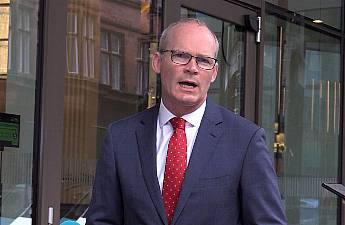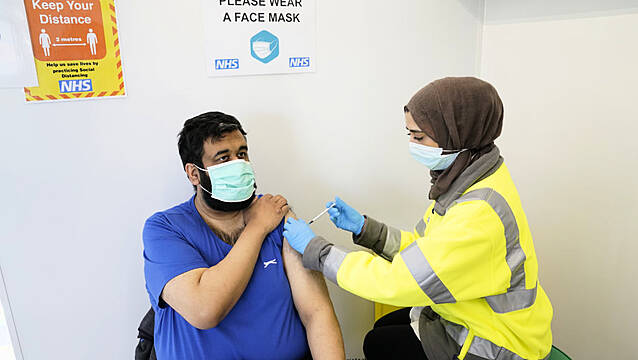It is possible that a new worrying variant of Covid-19 is already in the UK though current signs are reassuring, an expert at the UK's Health Security Agency (UKHSA) has said.
Dr Susan Hopkins, chief medical adviser of the UKHSA, said scientists are very concerned about the new variant found in South Africa, Botswana, Hong Kong and Israel, though no cases have been detected in the UK.
Concerns about the spread of the virus and the detection of variants in the UK have continually been closely monitored by officials in Ireland due to the proximity and high level of travel within the Common Travel Area (CTA).
British transport secretary Grant Shapps said the UK was “buying time” by adding South Africa, Botswana, Lesotho, Eswatini, Zimbabwe and Namibia to its travel red list, adding that the UK government was taking a “safety-first approach”.
Passengers arriving into the UK from these countries from 4am on Sunday will be required to book and pay for a government-approved hotel quarantine for 10 days.
Scientists around the globe are worried about the “horrific” number of mutations on the virus spike protein in the variant, which they fear could make it highly transmissible, more deadly and make vaccines less effective.
Dr Hopkins told BBC Radio 4’s Today programme that the variant had around “30 different mutations that seem relevant – that’s double what we had in Delta (variant)”.
She added: “If we look at those mutations, there’s mutations that increase infectivity, mutations that evade the immune response both from vaccines and from natural immunity, mutations that cause increased transmissibility.
“It’s a highly complex mutation, there’s also new ones that we have never seen before.”
She said the variant was the “most worrying” seen by scientists but much was as yet unknown.
South African scientists sounded the alarm over the variant, which they fear is behind a spike in cases in some regions, including the Gauteng province, which includes the cities of Pretoria and Johannesburg.
“What we’re seeing in South Africa is that they were at a very, very low point with very low amount of cases being detected a day,” Dr Hopkins said.
“In a shorter period than two weeks, they have more than doubled their epidemiology picture, they are saying that the transmission rates, the R value that they have in Gauteng – around where this was first found – is now 2, which is really quite high.
“We haven’t seen levels of transmission like that since right back at the beginning of the pandemic… So that would cause a major problem if you had that high transmission with this type of virus in a population where it may evade the immune responses that are already there.”
She said South Africa was not a highly vaccinated population but it was “highly immune” due to prior infection.
Work is ongoing to see whether the new variant may therefore be causing new infection in people who have already had Covid or a vaccine, or whether waning immunity may be playing a role.
Asked if it was possible the variant was already in the UK, she said: “Well, it’s always possible. We have no cases identified whatsoever yet, nothing in our genome sequencing… So overall, I think the situation is reassuring in-country, but of course, people are arriving every day.”
She added that one of the mutations in the variant is very similar to one of the mutations in Alpha, which means it can be detected quite easily with PCR tests.
Asked on ITV’s Good Morning Britain how likely it was the variant would come to the UK, Dr Hopkins said: “I think the measures that we take on borders are there to delay, to slow, to allow us to have time to gain more information.”
She added: “The fact this virus is resurging on a very immune population (in South Africa) is worrying.
“Clearly vaccines will help, because they will boost the antibody responses and the T cell responses in our body, which will help us fight variants, so global vaccination is a key component of that.
“But also we need to watch and wait and see as these new variants emerge and I think this shows that we may need new vaccines in the future.”
She said flu vaccines change every year and suggested the idea of having new vaccines for Covid was not surprising.
Mr Shapps said the British government acted as soon as the UK’s chief medical officers came to ministers following their meeting at around 4pm on Thursday.
He told the Today programme: “I think all the history of coronavirus suggests that it is best to act quickly, determine the extent of the way that the virus interacts with vaccines, treatments, transmissibility and then give yourself a bit more time.
“It is inevitable, of course, that it will go all around the world if it is going to do so.
“So this doesn’t prevent it from coming here, but it slows things up and gives us the chance to grow the cultures and test those questions about vaccines and treatments against it.”
Asked if the travel restrictions were about “buying time”, he said: “Yeah, that’s spot on. It’s about buying time.”
Other countries including Germany, Italy, Israel and Singapore have also restricted travel over the B.1.1.529 variant, with European Commission president Ursula von der Leyen tweeting: “The @EU_Commission will propose, in close co-ordination with member states, to activate the emergency brake to stop air travel from the southern African region due to the variant of concern B. 1.1.529.”
The @EU_Commission will propose, in close coordination with Member States, to activate the emergency brake to stop air travel from the southern African region due to the variant of concern B.1.1.529.
— Ursula von der Leyen (@vonderleyen) November 26, 2021
However, South Africa’s foreign minister Naledi Pandor said in a statement on Friday that the UK’s decision to ban flights “seems to have been rushed”.
She said: “Whilst South Africa respects the right of all countries to take the necessary precautionary measures to protect their citizens, the UK’s decision to temporarily ban South Africans from entering the UK seems to have been rushed as even the World Health Organisation is yet to advise on the next steps.
“Our immediate concern is the damage that this decision will cause to both the tourism industries and businesses of both countries.”
Professor Glenda Gray, president and chief executive of the South African Medical Research Council, told the programme the variant was showing between 26-32 changes in the spike protein of the virus and 45 amino acid changes.
She added: “We are entering into the fourth wave and whether it’s driven by this new variant is of high concern because it may mean that people who have been infected with Delta or other variants may not be protected this time around.”

Professor James Naismith, director of the Rosalind Franklin Institute in Oxford, told the programme the new variant will “almost certainly” make vaccines less effective though they would still offer protection.
He added: “If it spreads more quickly then yes it will get here, the travel ban will delay its arrival but if it spreads more quickly the lesson has surely been from all the variants we’ve seen before that it will get here eventually.”
Experts from the World Health Organisation (WHO) are meeting with South African officials on Friday to assess the evolving situation in the country.







